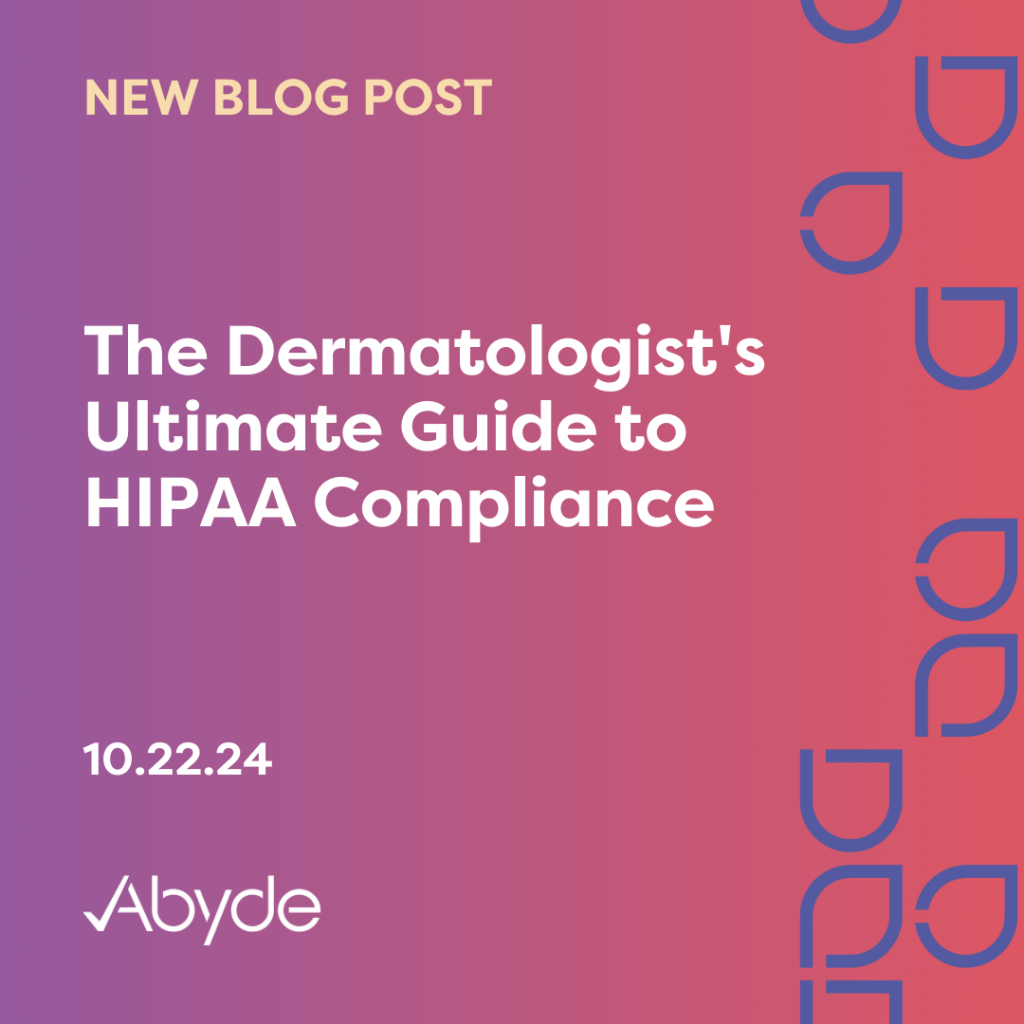July 1, 2025 HIPAA violations are not skin-deep. Dermatology practices, like all healthcare practices, are subject to HIPAA legislation. Common HIPAA violations erode reputation and patient trust, potentially costing your practice significant legal fees and fines. Dermatology practices have unique data, like photos of skin ailments and reports of skin biopsies, which must be securely handled. Sharing a picture of an abnormal mole without proper documentation, even if it looks harmless, is a HIPAA violation. Why? This is because the image includes identifiable health information about your patient. The good news? Frequent HIPAA pitfalls can easily be prevented with the proper safeguards and education. Being aware and implementing the right proactive safeguards secures your practice. Social Media 101 Before-and-after patient photos can be a powerful marketing tool on social media, but mishandling them could attract unwanted attention from the Office for Civil Rights (OCR). It’s totally normal to be proud of the great results you achieve for your patients. However, if you plan to share how your treatment helped a patient publicly, you must have that patient sign a media consent form. This form explicitly grants permission to share their healthcare procedures or results online. Beyond that, your practice must have a well-defined multimedia policy outlining how social media is handled. This ensures your entire staff is equipped and aware of their responsibilities regarding sharing information online, keeping everyone compliant, and protecting patient privacy. It’s also important to regulate your dermatology staff’s communication with patients on social media. While a patient may leave a positive review about how a chemical peel treatment made them look younger, you cannot confirm or deny whether that patient visited your practice. If you want to use a favorable review in your social media marketing, make sure the patient has signed the media consent form. Even a negative review can lead to a HIPAA violation if you’re not careful. While it’s tempting to defend your practice publicly, the cost of a violation far exceeds the initial frustration. For instance, one practice faced a $10,000 fine for disclosing Protected Health Information (PHI) on Yelp. The right move would have been to move the conversation offline and communicate with the patient privately through a secure channel. Staying Ahead: Security Risk Analysis One of the most common fines is missing a vital piece of proactive compliance. The Security Risk Analysis (SRA) is a thorough assessment of all the safeguards your practice has in place to secure PHI. The minimum annual SRA must be completed before and after a HIPAA breach, showcasing your practice is aware of vulnerabilities and documenting how they are addressed. This isn’t an isolated issue; it’s a widespread compliance gap, with only 14% of healthcare practices able to produce a compliant SRA during random audits. The recent case of a dermatology organization that faced an investigation after a substantial ransomware breach. The incomplete SRA discovered during the investigation led to a hefty $250,000 fine for the practice. It’s a common misconception that fines are solely a consequence of ransomware attacks. However, the true underlying reason for a fine is the failure to implement appropriate preventative safeguards. While ransomware attacks and cybercrimes can certainly occur despite even the most robust safeguards, a practice’s preventative and reactive response and ability to mitigate risk swiftly determine whether a fine is levied. Improper Paper Trails The entire lifecycle of PHI, from generation to deletion, needs to be handled securely. This includes properly shredding and disposing of records. Any image of a patient’s skin, old samples, etc., must be disposed of securely. First, records need to be kept for at least six years, but once disposed of, they cannot be traced to patients and must be destroyed entirely. Simply putting records in the trash isn’t going to cut it. In fact, Business Associates can handle data destruction for your practice. A dermatology practice was fined for improper disposal. Empty specimen containers, with PHI on the label, such as patient names, dates of birth, and more, were thrown in unsecured trash. After discovering that this disposal was typical for the dermatology organization for years, the practice was fined over $300,000. How to Avoid Common Dermatology HIPAA Violations The right HIPAA compliance program can avoid these common missteps. Proactive compliance, including thorough training and a maintained SRA, is key to the success of your dermatology practice. While handling your practice’s compliance program might feel overwhelming, compliance solutions can streamline this process. Intelligent software can easily pinpoint and address common violations in a centralized compliance hub. By maintaining control and proactively addressing compliance gaps, your practice can achieve peace of mind. Meet with a compliance expert today to learn more about simplifying HIPAA compliance for your dermatology practice.
OSHA in Dermatology: Best Practices to Achieve Compliance
June 12, 2025 While working in a dermatology office might have you focused on taking care of your patients’ skin, your health should be the first priority. It’s easy to incorrectly assume a dermatology office is a relatively “safe” healthcare environment. After all, we’re not typically dealing with the same acute emergencies as an ER. Dermatology presents many challenges when working with patients, such as lasers, sharp instruments, chemicals, potential exposure to bloodborne pathogens, and more. With these unique challenges, your practice must be aware of the safeguards the Occupational Safety and Health Administration (OSHA) requires. More than Skin Deep: Facility Risk Assessment An annual Facility Risk Assessment (FRA) is the foundation of your OSHA compliance program. The FRA is a thorough assessment of the healthcare hazards your practice might face. This assessment spans from your staff is trained, to unique equipment you might use, how situations are prevented, and even how management handles workplace safety. Since this is an annual requirement, this assessment must be kept current. If your practice introduces anything new that might heighten risk, this needs to be documented. For instance, if your practice begins offering laser treatments, this must be mentioned in the FRA and also staff must be trained on how to use it safely. By reviewing and addressing potential vulnerabilities in your practice, you can mitigate risks and ultimately keep patients safe. Personal Protective Equipment (PPE) in Dermatology: Your First Line of Defense While you advise patients on sun protection, remember that your staff’s skin needs protection, too. Always ensure that it remains covered with Personal Protective Equipment (PPE). PPE, like gloves and masks, are essential barriers that keep your team safe. Your practice must supply this PPE and provide comprehensive training on how to use it correctly. For instance, when a staff member is with a patient, a new set of gloves is always required. From putting them on to how they must be disposed of, these are all critical ways to keep staff members safe. Depending on the treatment, your staff may also need eye protection. As a result, it’s essential to review all available forms of PPE with staff before they start working with patients. Dermatology Laser Safety When it comes to lasers in your dermatology practice, preparation is paramount. It’s not enough to just have the equipment; you need to ensure every team member is properly trained and fully aware of the risks associated with these powerful devices. Once again, proper PPE is vital, such as eyewear and gloves. Additionally, the room where the laser is being used must adhere to safety guidelines, including not having any reflective surfaces for the laser to shine off. Your practice should designate a Laser Safety Officer to oversee and enforce compliance. This staff member is likely already your OSHA Safety Officer, or OSO. This Laser Safety Officer needs to ensure staff is routinely trained on lasers, especially if new equipment is being used. For staff safety, the laser device must be off when not in use. While laser treatments offer dermatologists innovative possibilities, proper staff training always remains crucial. Keeping Your Dermatology Practice Safe Ensuring the safety of your dermatology practice is not just about compliance; it’s about fostering a secure environment for both your dedicated staff and your valued patients. Your practice can proactively address potential hazards by diligently conducting annual facility risk assessments, consistently utilizing appropriate personal protective equipment, and prioritizing comprehensive training. With the right solution, your practice can streamline these requirements. Smart software can utilize the answers from your FRA and provide thorough policies and procedures and recommended training. A safe practice is a successful practice. To see how you can streamline compliance for your practice, schedule a meeting with a compliance expert today.
The Dermatologist’s Ultimate Guide to HIPAA Compliance
October 22, 2024 Did you know that a dermatology center was fined over $300,000 for violating HIPAA? HIPAA compliance is not always top of mind when managing your dermatology practice. Administrative tasks can easily take a back seat with a focus on diagnosing and treating skin conditions. Nevertheless, it’s crucial to prioritize HIPAA compliance. Discover what steps you need to take to ensure the safety of your dermatology practice. What’s Protected Health Information? Protected Health Information (PHI) is sensitive data that can personally identify a patient. Examples of PHI include a social security number, birth date, medical records, and even images of skin ailments for dermatologists. These images can contain personally identifiable information, such as tattoos and unique birthmarks. When working with patients, it’s crucial to ensure all images and other forms of PHI are encrypted and protected behind essential safeguards to secure patient information. Social Media 101s When sharing images of your patient’s treatment, such as before-and-after images of acne treatment, it’s important to do so compliantly. While you might think you’re sharing a feel-good story, patient images are considered Protected Health Information (PHI), and sharing them without consent could violate their privacy. You need the patient’s signed media consent form to share these images and patient reviews on social media compliantly. This form ensures that the patient understands and agrees to use their image and treatment details being shared with the public. Improper Disposal The largest dermatology HIPAA fines, totaling over $300,000, were imposed due to improper disposal. Some states have even stricter laws regarding discarding old patient files, which must be retained for at least six years on a federal level. These files also need to be encrypted throughout the creation to disposal process. When getting rid of sensitive information, ensure it is shredded and properly disposed of. Partner with a disposal company specializing in medical paperwork and waste and have a Business Associate Agreement in place. How Software Solutions Can Help Dermatology helps patients feel comfortable in their own skin, both literally and figuratively. Implementing the appropriate safeguards to protect patients’ data is just as important. By utilizing smart software, you can see where your dermatology practice stands and what you need to do to be compliant. To learn how you can protect your dermatology practice, schedule a consultation with an expert.
OCR Settles Case Concerning Improper Disposal of Protected Health Information
August 24, 2022 When it’s time to clean out and organize that ole garage, you probably want to take time to make sure all your sensitive and sentimental items – files, photographs, etc. – are in the right spot before taking them to the dump. It should be no different when it comes to disposing of old devices or hard drives at the office that contain sensitive ePHI, yet practices continue to fail. In recent news, the OCR announced a settlement for a dermatology practice located in Massachusetts that failed to properly dispose of protected health information. As a result, the dermatology practice agreed to pay the hefty fine of $300,640 to the OCR and implement a Corrective Action Plan to resolve the investigation. It may be obvious that paper records require proper disposal – in most cases, shredding or recycling – so that the information cannot be read by the wrong parties. Despite this being common practice, the Massachusetts dermatology practice had PHI that was exposed. Improper disposal is even more common when it comes to disposing of electronic protected health information (ePHI) properly. It is critical that your practice understands how and where to dispose of PHI. But what exactly constitutes proper digital data disposal? Disposing of your PHI is not as simple as clicking the delete or trash button. If you do not completely delete these files from your devices, they can be recovered using high-tech software. The following are some thorough methods for properly disposing of PHI: There are lots of devices that could have been used to store PHI even though you would never realize they do. These devices include: Before you burn those electronic devices in a campfire, remember that HIPAA requires practices to keep PHI for at least 6 years, and maybe longer depending on your state. Devices containing data that is older than six years should be backed up before being wiped clean, and data should be encrypted while being kept. At the end of the day, whether it is boxes of important documents in your garage at home or PHI at your very own practice, it is critical to dispose of it properly and safely.



